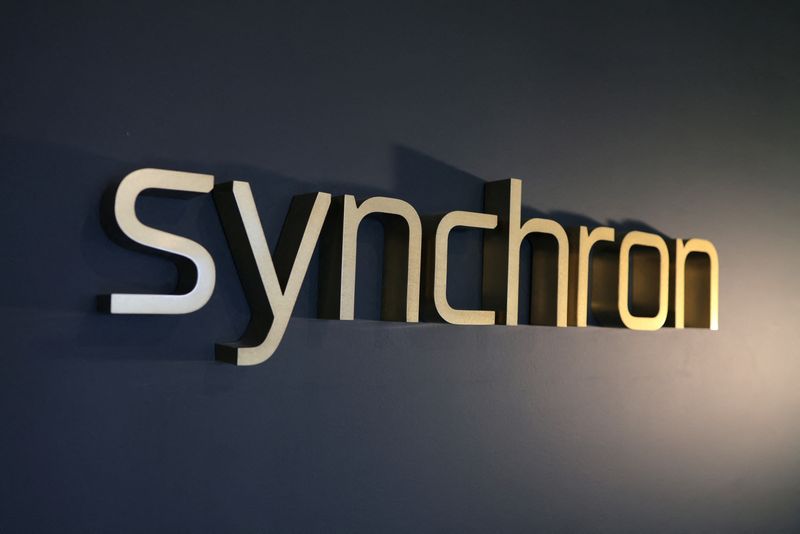By Marisa Taylor
WASHINGTON (Reuters) - Synchron Inc, a rival to Elon Musk's Neuralink brain implant startup, is preparing to recruit patients for a large-scale clinical trial required to seek commercial approval for its device, the company's chief executive told Reuters.
Synchron on Monday plans to launch an online registry for patients interested in joining the trial meant to include dozens of participants, and has received interest from about 120 clinical trial centers to help run the study, CEO Thomas Oxley said in an interview.
"Part of this registry is to start to enable local physicians to speak to patients with motor impairment," he said. "There's a lot of interest so we don't want it to come in a big bottleneck right before the study we'll be doing."
New-York based Synchron is farther along in the process of testing its brain implant than Neuralink. Both companies initially aim to help paralyzed patients type on a computer using devices that interpret brain signals.
Synchron received U.S. authorization for preliminary testing in July 2021 and has implanted its device in six patients. Prior testing in four patients in Australia showed no serious adverse side effects, the company has reported.
Synchron will be analyzing the U.S. data to prepare for the larger study, while awaiting authorization from the U.S. Food and Drug Administration to proceed, Oxley said. Synchron and the FDA declined to comment on the expected timing of that decision.
The company aims to include patients who are paralyzed due to the neurodegenerative disease ALS (amyotrophic lateral sclerosis), stroke and multiple sclerosis, Oxley said.
Mount Sinai in New York, the University at Buffalo Neurosurgery and the University of Pittsburgh Medical Center (UPMC) are collaborating on the preliminary study. Synchron said it hopes to involve these centers in the larger trial.
Dr. David Lacomis, chief of UPMC's Neuromuscular Division, said his team is still participating in the preliminary human testing “and the study is going well.”
"Subjects continue to be monitored for safety and an extensive amount of data are being collected as the brain implant is being used," he said. "A much larger pivotal trial is in the planning stages."
The Department of Neurosurgery in the Jacobs School of Medicine and Biomedical Sciences at the University at Buffalo has two patients in the small trial.
"Our site has enrolled the first and only stroke patient as we feel this is a significant population that can benefit," said department chair Dr. Elad Levy. "We are optimistic and excited about the next phases of this technology."
EXPANDING THE MARKET
Synchron, whose investors include billionaires Jeff Bezos and Bill Gates, and Neuralink compete in a niche of so-called brain computer interface (BCI) devices. Such devices use electrodes that penetrate the brain or sit on its surface to provide direct communication to computers. No company has received final FDA approval to market a BCI brain implant.
Synchron's device is delivered to the brain via the large vein that sits next to the motor cortex in the brain instead of being surgically implanted into the brain cortex like Neuralink's.
Neuralink, which has mainly announced developments on Musk's social media platform X, did not respond to questions about its clinical trial. The company has so far announced that it implanted its device in one paralyzed patient.
Testing an implant in stroke patients can be particularly challenging, as an individual's brain may be so severely damaged that there isn't sufficient neural signaling to record.
The FDA has asked Synchron to screen stroke patients using a non-invasive test to determine whether they would respond to an implant, Oxley said.
"They want to expand the market to people who have had a stroke severe enough to cause paralysis because if limited to quadriplegia, the market is way too small to be sustainable," Kip Ludwig, former program director for neural engineering at the U.S. National Institutes of Health, said of Synchron.
In 2020, Synchron reported that patients in its Australian study could use its first-generation device to type an average of 16 characters per minute.
That's better than non-invasive devices that sit atop the head and record the electrical activity of the brain, which have helped people type up to eight characters per minute, but not the leap forward that is hoped for with an implant, Ludwig said.

Oxley would not say whether typing has gotten faster or offer any other details from the ongoing U.S. trial.
In May, Synchron said it acquired an equity stake in medical component maker Acquandas, as it looks to boost manufacturing. Musk has approached Synchron about an investment in the past, Reuters reported.